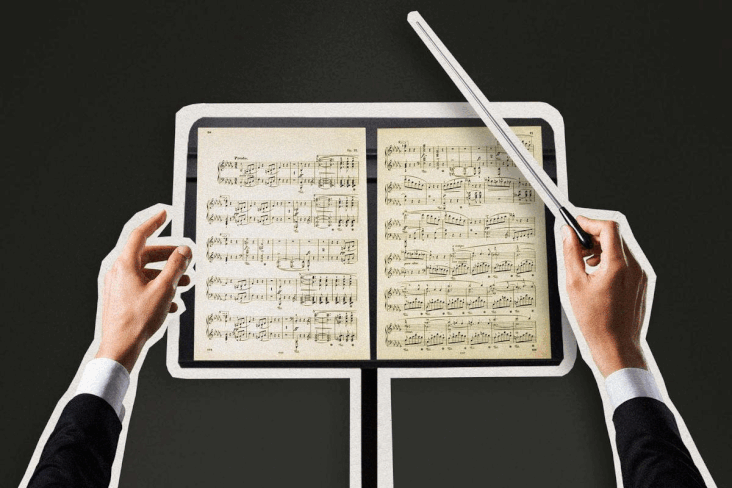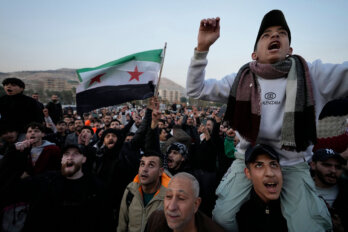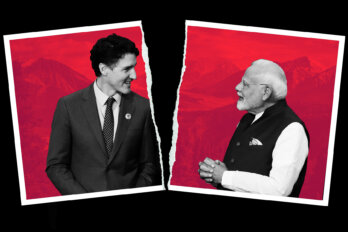Since the beginning of the Russian war on Ukraine, people have been expressing solidarity with Ukraine in constructive and inventive ways. Parents have left strollers at the Polish border for those fleeing with small children. Uber provided free ride-shares to help refugees evacuate, and Airbnb users booked empty Ukrainian rentals as a way to funnel money to their owners. Medical professionals have been sharing instructions on wartime care. We’ve wrapped ourselves in blue and yellow at public demonstrations, donated money, and organized fundraising events.
We want, and need, to do more. When Ukrainian president Volodymyr Zelenskyy requested airspace intervention in his address to Parliament last month, Elizabeth May’s response was a poignant case in point: we don’t want to let you down, we are letting you down, we are trying not to let you down. Helpless and angry, we mill and shout, Kaitlyn Tiffany wrote recently in The Atlantic, with “the agitated, aimless buzzing of the type of crowd that gathers in the aftermath of some bewildering catastrophe.” Not all of the buzzing makes sense, and not all of it shows humanity at its best.
In February and March, a number of cultural organizations began making symbolic gestures and statements to denounce Russia’s aggression. The Cardiff Philharmonic removed Pyotr Ilyich Tchaikovsky’s 1812 Overture from an upcoming program. The Montreal Symphony Orchestra and the Vancouver Recital Society both disinvited the same Russian piano prodigy, Alexander Malofeev. Concert organizers in Switzerland cancelled a performance by Russian cellist Anastasia Kobekina. The Glasgow Film Festival withdrew two Russian features. The Royal Opera House called off a residency by the Bolshoi Ballet. The Canada Council for the Arts announced the withdrawal of support from partnerships and projects involving Russian or Belarusian artists. Arts Council England advised all arts organizations to cease collaborations with Russia and Belarus, cancel tours, and recall museum and art works on loan.
The decisions were not always arbitrary or insensitive. The Cardiff Philharmonic justified its cancellation of the 1812 Overture because of the martial context and content of the piece (which commemorates the Russian military success against Napoleon, with a finale that is famously all canons and fanfare), as well as because of a musician’s family ties to Ukraine.
Some of the Russian cancellations were appropriately punitive, such as terminating contracts with pro–Vladimir Putin conductor Valery Gergiev. Others were empty gestures: the Canada Council acknowledged, in a statement to the CBC, that there were no Russian or Belarussian co-productions being funded in the first place. Part of the Vancouver Recital Society’s explanation, meanwhile, was that it wanted to protect Malofeev from the kind of Russophobia that has led to vandalism and harassment—which, while it may seem well-intentioned, implies an acceptance of the very narrow-mindedness promoters were denouncing.
These cancellations are also being amplified and enabled by the shorthand and polarization that characterize social media. “You’ve made your bed now lay on it” shot one Twitter user, referring to the cancellations of Russian artists. Russians, another suggested, “need to see the consequences of keeping [Putin] in power.” The chorus of “sorry not sorry” suggested, essentially, that the backlash against Russian artists was righteous and deserved.
The toll is nowhere near what Ukrainians are suffering. But cultural boycotting as an acceptable collateral consequence of war is egregious. There’s no reason to discriminate against individuals. Thousands in Russia, as well as in countries under the Russian yoke, like Belarus, have risked considerable retribution by speaking out against the war. Thousands of protesters have been detained. Prominent critics of the regime—including, most visibly, opposition leader Alexei Navalny—have been poisoned in the past. There have long been efforts to silence journalists who don’t toe the line; several have been assassinated. The country has blocked multiple Western news outlets and social media platforms. In early March, the Kremlin passed a law threatening up to fifteen years of jail time for those who report news on the military that contradicts official statements. Expecting Russian artists to publicly criticize their autocrat-in-chief when they or their families still live in the country is asking them to sacrifice their domestic livelihoods, their safety, and the safety of their families. Malofeev, who had previously spoken out against Russia’s aggression against Ukraine, pointed out the risk: “I am contacted by journalists now who want me to make statements. I feel very uncomfortable about this and also think that it can affect my family in Russia.”
These reactive cultural sanctions are affecting individual artists and organizations far more than they are putting any pressure on the Kremlin—lost income and opportunities in fields defined by economic and professional struggle are devastating at any stage of an artist’s career, not to mention the risk of becoming persona non grata. As poet Valzhyna Mort asked, are Russian individuals—artists, émigrés—being punished because Putin can’t be? These artistic sanctions are a world away from the reasoning behind the economic sanctions, which are intended to isolate Russia. Like the economic sanctions, however, their impact is felt much more immediately by citizens than by any Russian politician. Does Putin care if individual artists do or don’t perform? If they have any impact at all, the cancellations may play into the Russian regime’s narrative about the “hostile” acts of the “collective West”—a characterization of NATO that serves as a philosophical counterpoint, socioeconomic scapegoat, and Russophobic supervillain in Putin’s rhetoric.
To the extent that the Kremlin is aware that there’s a little less Tchaikovsky being played or that a Russian kid isn’t touring, the cancellations are serving as confirmation that the West is waging a cultural war against Russia. But the impact on artists is potentially significant, not least because artists are already usually in a state of financial precarity. Undermining them professionally, silencing their work, and pressuring them to speak out against the war at their own risk not only fails to do anything to support Ukraine, it’s also unfair to the artists, many of whose work tends to be antiwar. Meanwhile, the military machine marches steadily on.
We can’t blame Russian artists for this war. We can’t blame Russian citizens either, for that matter. It is Putin’s war. Boycotting Russian artists breeds prejudice in those who can’t tell the difference between diplomacy and discrimination. The recent spate of cancellations seems more like bandwagon-jumping at best, bigotry at worst. I don’t want to insinuate, as some seem to, that the current anti-Russian sentiment—targeting Russian restaurants, churches, community centres, and even Russian children in schools—is reminiscent of the internment of citizens with ethnocultural ties to Axis powers during the Second World War or Central powers during the First World War (including, with the kind of bitter irony that history does so well, Ukrainians). But there is something trendily, superficially vitriolic about it. It’s depressing enough to make one nostalgic for the petulance of the “freedom fries” and “freedom toast” shilled in the United States after France opposed the invasion of Iraq.
Worse, a superficial display of morality can lead to dangerous complacency: we think we have done a good thing, that we have done something, that we have done enough. We are relieved to be on the right side of history. We go on with our lives. We do not remember that, as the twentieth century tried to teach us, nothing we do to stop human suffering is ever enough. We will always want, and need, to have done more.
There are over a dozen major armed conflicts taking place right now, in Afghanistan, in Yemen, in Darfur; the conflict in Syria is more than eleven years old and has killed hundreds of thousands of people and displaced millions. In central Africa, the fight against Boko Haram drags on. Around the world, people are oppressed, occupied, unsafe. Why do some human lives seem to matter less? Racism, Islamophobia, xenophobia, Eurocentrism—take your pick. We also pay less attention to global conflicts when we don’t understand what’s going on and don’t know with whom to side. We dismiss them as a domestic matters; we call them civil wars. Russia seems like a clear adversary, not least because many of us remember the Cold War. Our generation practised ducking and covering. We read novels about falling in love in a fallout bunker and then going outside to forage in the postapocalyptic wasteland. The Russia–US binary was so unambiguous that Sting felt moved to humanize Russians, reminding us that Russians “love their children too.” The reaction to Russia’s invasion of Ukraine seems like an extension of that long, easy polarization between good and evil.
Not only is the current focus on Russian-affiliated art baffling given the many wars, coups, and invasions that have been carried out around the world with utter impunity, but the boycotts are revealing of how selective we are. We’re really invested in the right kind of villain, the right kind of refugee, the right kind of artist.
Are there ways to act constructively instead of punitively? Instead of suspending artistic collaborations in countries where art and expression often exist under duress, can we find ways to make sure that artist-refugees, including those now fleeing Ukraine, have access to instruments, supplies, space, and support when and where they land? Can we take the opportunity to learn more about Ukrainian culture and artists? To program and promote more artists from countries whose cultural production has been overshadowed, minimized, or eroded by their imperialist neighbours? To donate to the artists who are still in the country, who cannot leave or have decided to stay? As the Russian attacks target cultural artifacts and production, can we help protect Ukrainian archives and artworks? Can we provide safe platforms for dissident artists? Can we build bridges with Russian artists, promoting the kind of East–West cultural exchange that led to the fall of the Berlin Wall? Instead of destroying, erasing, and cancelling, what can we erect? How can art be a rampart rather than just a flag?
Empty sanctions make us complacent and sanctimonious. They unfairly and counterproductively penalize artists, and they feed a fabricated and blood-stained divide of us versus them. If boycotts are nothing more than virtue-signalling, if they’re not justified and buttressed by tangible effects and empathy, and if they’re not able to accommodate the contradictions and complexities inherent in citizenship versus nationhood, then they risk doing more harm than good.





